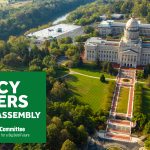Nearly two years ago, in June 2020, the Prichard Committee released a Call to Action for Racial Equity & Justice. In that statement, we expressed our commitment to doubling down on a longstanding call for greater equity in education outcomes, for greater systemic and community accountability for the progress of each and every student. We committed to continuing to press policymakers to invest in adequate and equitable education – early childhood through postsecondary – and an accountability system that ensures each Kentucky student has the opportunities and the support to meet and exceed their potential.
As part of that Call to Action, we called on all elected and appointed leaders to require competency in cultural responsiveness and implicit bias for all those working, or training to work, in the public sector. We committed to doing the same and re-emphasized the Failure to Deliver adequate and equitable education for students of color.
In June 2021, in the wake of the filing of BR 60 & 69, we issued a Statement of Opposition to outright limits on discussions regarding race, sex, gender, or religion in public school and/or university curricula. Such limitations may in fact reduce the quality of education provided by our educational institutions and received by our students. Moreover, they send the wrong message about Kentucky’s progress in advancing racial equity and attracting and retaining a diverse workforce. We urged, instead, Kentucky should engage in a solutions-focused process and discussion to improve culturally relevant and inclusive education practices. Such a process is a systemic way to inform the development and revisions of our state standards and model curriculum framework which empowers students with the abilities and capacities in KRS 158.645 and KRS 158.6451 needed to become informed citizens.
As Juneteenth National Independence Day, a day dedicated to celebrating freedom from slavery neared, we drew attention to the importance of teaching our history, underscoring the need for our students to have the opportunity to have rich discussions, particularly about our history and current events within the context of history. We encouraged leaders to help parents understand the importance of viewing historical events and current events through an historical lens, so that we are not doomed to repeat the history of our past. It’s taken many years for us to improve as a country. Our students need to understand this – and understand we still have a long way to go.
Simply put, the Prichard Committee opposes bills that restrict teaching, prohibit instructional materials, or staff development efforts based on the ideas involved. Thus, we oppose House Bills 14 and 18 (previously BR 60 & 69), and we oppose House Bill 487 on the same basis. We oppose the various ways those bills would impact teachers’ certificates, district finances, or the accreditation of teacher preparation programs.
While we also oppose Senate Bill 138, it’s important to note that it is a different kind of legislation. Senate Bill 138 does not restrict teachers, prohibit texts, nor does it prohibit the types of professional development districts can use. SB 138 mandates a set of texts to be added to Kentucky’s academic standards and assessments. It adds two teaching method requirements and a staff development rule and calls for instruction and materials to be consistent with a set of principles. We oppose these legislative mandates because Kentucky has an established process of standard revision set forth in Senate Bill 1 (2017) and a commitment to local decision-making for curriculum and instructional materials, where parents and local leaders can be involved in those decisions. Further, Senate Bill 1 (2022) reinforces this commitment to local decision-making. SB 138 would do less harm than the House Bills, but it is still the wrong step.
Further, we see no evidence that such bills are needed. Kentucky’s careful and regular review of standards, with stakeholder engagement, is working well. The weight of legislation should address well-demonstrated Kentucky problems that seek to improve education outcomes. These proposed pieces of legislation do not address a well-established need.
The Prichard Committee:
- Asks Kentuckians to engage fully with their schools, learning directly from students, teachers, and staff about the work happening there.
- Advocates a groundswell of support for the good work being done in those schools
- Calls for debates about any weaknesses in that work to be based on sound information and mutual respect – and a focus on solutions that support the Commonwealth’s progress.
- Urges all Kentuckians to be open to engaging hard truths about America’s history with injustice in our past and to work to ensure we pass on the learning from those times in order not to repeat them. We can only truly know our own personal lived experience. Striving to hear and understand another’s, is critical for progress.
To be clear, the Prichard Committee is opposed to House Bills 14, 18, and 487, as we believe they are unnecessary and harmful in supporting a world-class public education. SB 138, we continue to have concerns, even with the amendments made, and we believe it is for situations like these the standards revisions process was created. We should let that process work.
The power of legislation should seek to improve education outcomes for Kentuckians of all backgrounds. Kentucky needs to support our educators with respect and resources that support their capacities to deliver a learning environment rich in inquiry, deep in understanding, and – above all – in honor to each and every learner in Kentucky’s classrooms.





Comments are closed.